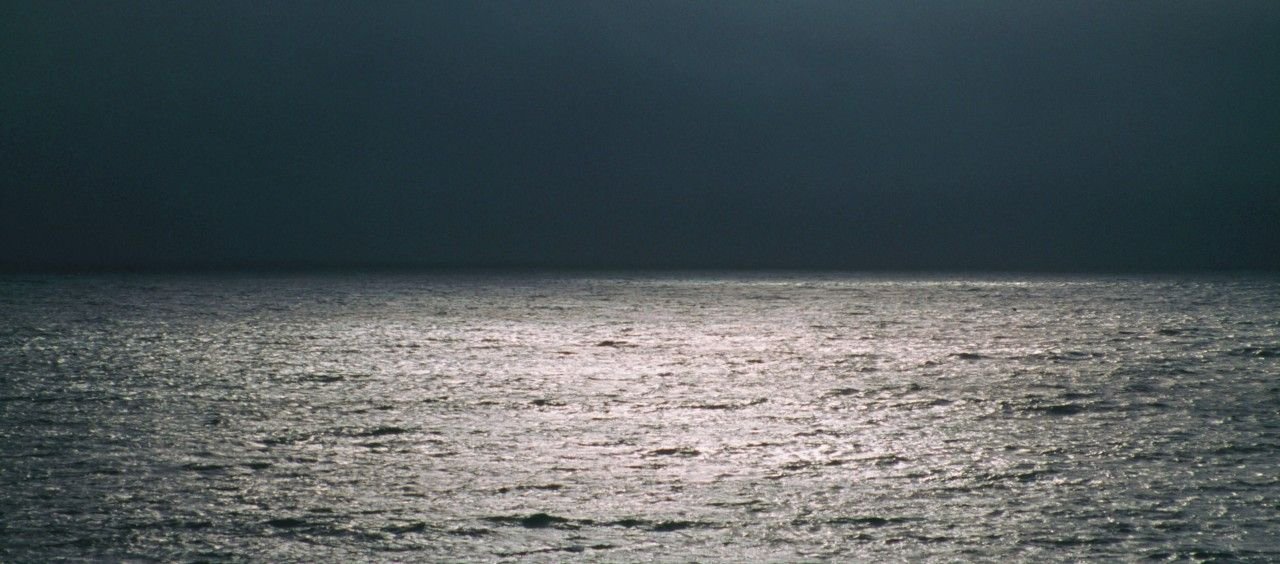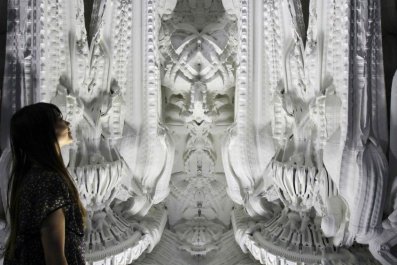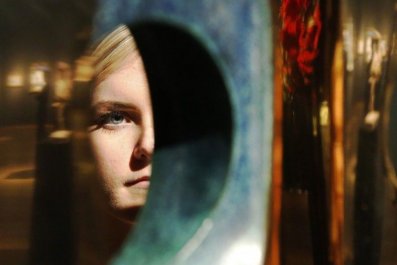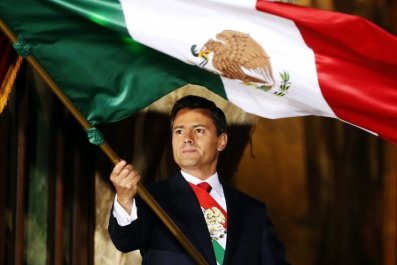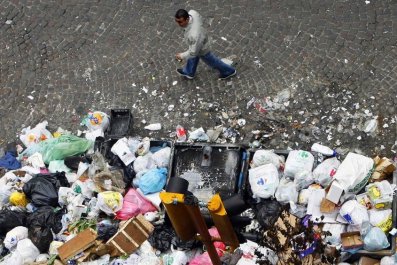If you have the leisure time to read Newsweek, then you probably live with a generally manageable nexus of concerns. You know you are going to die, but are not terribly bothered by existential finitude. It is the mundane that overwhelms you: the way someone at the office chews crackers loudly, how this one college friend always calls to complain, where you might vacation next. Sometimes, your mind ranges further afield, into speculative realms: Is this what I thought I'd be doing at 40? Should I give more to charity? What is the point of recycling? But these are infrequent divagations.
Then there are the things you could not possibly think about, even if you had the time. Maybe you can conceive of the inexorable infinity of death, but I am close to certain that no human mind can grasp the not-quite-infinity of 4.468 billion years, which is the half-life of uranium-238. Or 210 million gallons of oil, the amount deposited in the Gulf of Mexico by the Deepwater Horizon oil spill in 2010. The World Wildlife Fund says we may be losing as many as 100,000 species to extinction each year. That number is alarming, but so large that it passes quickly from the astounding to the incomprehensible, before collapsing into irrelevancy. Same with the number of Americans estimated to have gotten cancer in 2013: 1,660,290. You probably don't know or care about 1,660,289 of them. It's very hard, after all, to worry about something you can't understand.
Hyperobjects: Philosophy and Ecology after the End of the World by Timothy Morton is a book of quasi-popular philosophy (hope you've at least skimmed your Heidegger and Kant) about the very big things that have come to dominate human existence: cancer, global warming, radionuclides, petrochemicals. Morton is the head of the English department at Rice University and a leader in the field of object-oriented ontology, affectionately known as OOO, a relatively recent philosophical movement that declares the human being just one thing among many things. Human consciousness, for OOO true believers, isn't all that special, even if we are a thing that can write epic poems, perform Bach concertos, and run a mean pick-and-roll.
For a book concerned with hugeness, Hyperobjects is a pretty slight 200 pages. But density of ideas trumps word count. Morton, the son of a musician who played violin in the Beatles' song "A Day in the Life," has written books on Romantic poetry and food (The Poetics of Spice: Romantic Consumerism and the Exotic, along with Radical Food: The Culture and Politics of Eating and Drinking, 1790-1820) and can do a decent imitation of Bill Clinton (for a Brit). In other words, he may well be a hyperobject himself. Not only does Morton range from William Wordsworth to the Velvet Underground to Nagasaki to Republican denialism, he does it in a way that marshals these disparate allusions in the service of a cogent idea, one that manages to come off as both intuitive and radical. We have long known that the world is beyond our control; Morton says that it is now beyond even our understanding. What's worse, we made it that way by playing Prometheus for the last couple of centuries, estranging us from the ground beneath our feet.
So what are hyperobjects, exactly? That's an excellent question. I may as well allow Morton to answer, since he invented the concept. Hyperobjects, he writes, are:
directly responsible for what I call the end of the world
real whether or not someone is thinking of them
real entities whose primordial reality is withdrawn from the world
a good candidate for what Heidegger calls "the last god"
harbingers of a truly "post-modern" age
very uncanny
vivid and often painful
viscous
disturbingly squishy and mollusk-like
impossible to handle just right
As is probably evident from the above, Hyperobjects is occasionally insane; far more frequently, though, it is brilliant. I can't pretend to have gotten the whole thing, and I suspect that few outside the university will. That shouldn't hinder the inquisitive, though. The notion of hyperobjects is thankfully broad enough to accommodate many gradations of comprehension. The one concept I am fairly confident Morton wants to convey to every reader is a humility about our own place in the world. Given to clever aphorisms, he writes that "[true] planetary awareness is the creeping realization not that 'We Are the World,' but that we aren't."
Morton's ideas tap into a rising collective unease. A recent series of viral images show what American cities would look like if cell phone radiation were visible. The renderings, by the artist Nickolay Lamm, are awash in the brilliant colors of electromagnetic waves, entirely subsuming the familiar cityscape. His Chicago does not look like our Chicago, but it's probably a more valid representation of the city, from the physical science standpoint, than what you see strolling along Michigan Avenue (also just waves, right?). Yours, I am sorry to say, is the outdated conception. His is the city of hyperobjects.
The hyperobject Morton worries most about is global warming, which he refuses to turn into the defanged "climate change." I can imagine a reader being weirded out by the way Morton switches intellectual registers, from the heady abstractions of ontology to the mundanities of carbon dioxide emissions, but that's precisely the point: we don't have the luxury of living in the world created by Aristotle and mulled over in the groves of academe. Carbon dioxide is all we've got - or, more to the point, it has got us all by the cojones and isn't letting go, the newfound ubiquity of bike lanes notwithstanding. The growing deposits of nuclear waste, like the thinning ozone layer, so thoroughly alter the physical world that we become strangers in a once-familiar domain, subject to forces that defy your standard Sunday school cosmology. "Hyperobjects such as global warming and nuclear radiation surround us, not some abstract entity such as Nature or environment or world. Our reality has become more real, in the sense of more vivid and intense, and yet it has also become less knowable," Morton writes. Or, as Martin Lawrence puts it more pithily in the 2003 movie Bad Boys 2, "S**t just got real."
When he declares that the world is over, Morton is not summoning visions of a Hollywood We're-all-gonna-die! cataclysm but, rather, the end of the cozy anthropocentric worldview that has governed Western thought since the advent of Greek philosophy. It doesn't matter what you think of Kantian epistemology or Hegelian teleology because, Morton claims, the "privileged transcendental sphere" of philosophy can't protect us from ultraviolet rays or rising ocean levels. "Even Pat Robertson and Richard Dawkins must use sunscreen to counteract the effects of ozone depletion." One is a God-fearing zealot, the other a smug atheist. Their worlds could not be more different. But that doesn't matter to melanoma, which is not a matter of faith or worldview or opinion, but a creeping malignancy no amount of prayer or punditry will halt.
In Morton's version of history, the end of the world began with James Watt's invention of the steam engine in 1784, which inaugurated our petrochemical addiction. For the next century and a half, we lived in the Anthropocene age, "when a layer of carbon [was] deposited by human industry throughout Earth's top layers of crust." Then, in the summer of 1945, when the United States dropped two atomic bombs on Japan, humanity entered what Morton calls the Age of Acceleration, "in which the geological transformation of Earth by humans increased by vivid orders of magnitude." We had mastered the world so thoroughly with the advent of atomic power (well, really, weaponry) that it started getting away from us, à la Dr. Frankenstein's monster. Radioactivity is a perfect hyperobject, pervasive and invisible, ruinous, and unruly. There is the non-ionizing radiation of cell phones, which may or may not cause brain cancer, and the Elephant's Foot of Chernobyl, a mass of lava so aglow with decaying radionuclides that it cannot be safely approached. And it is a force utterly hidden from the human senses, a monstrous minusculity couched within the atom.
You might assume, because of the reference to "ecology" in the book's subtitle, that Morton is an environmentalist. He is nothing of the sort, deriding the greens for a lightweight fetishization of nature. It does, after all, take a measure of hubris to declare something natural and something else not. Environmentalism thus hopelessly belongs to the very same anthropocentric view Morton says no longer has traction in this posthuman world. My coffee cup is made of polystyrene, which comes from hydrocarbons, which come from decayed dinosaurs. What could be more organic than that? Morton's Twitter biography sums it up neatly: "One of the things that modern society has damaged has been thinking. Unfortunately, one of the damaged ideas is that of Nature itself." Ecology, for Morton, retains its original Greek meaning: oikos (house) and logia (study). In our house are the melted reactors of Fukushima, the Great Coral Reef, and the filthy little patch of grass (a "greenspace") where three avenues intersect near my house in Brooklyn. We have no choice but to tend to all of them.
Nor is Morton optimistic about the ability of human knowledge to fix a world human knowledge just about ruined. He is especially skeptical of the rise of Big Data and its Silicon Valley apostles, who preach about the salvific power of information. Morton writes that the "more data we have about lifeforms, the more we realize we can never truly know them." We have sequenced the human genome, have cloned dogs, pigs, and even an ibex. But the basic stuff of life remains a mystery, as it always will. A tsunami comes, kills thousands. Sitting is the new smoking, they cry. Time's winged chariot draws ever closer, to borrow from the metaphysical poet Andrew Marvell.
I thought of poetry often while reading this book, Morton's beloved Romantics especially. Writing during the Industrial Revolution, poets like Blake and Wordsworth were similarly aware of ominous change afoot. The epigram to Hyperobjects is a quote from Percy Bysshe Shelley, about the "awful shadow of some unseen power," and various knotty issues of OOO aside, it's pretty clear that what Morton wants is for us to live with humility, to restore a sense of awe for a world that is much bigger than we are.
I've bastardized and simplified Morton's ideas throughout this essay, so I may as well do it one last time: his notion of the hyperobject is not all that different from Romantic conceptions of the sublime. The philosopher Edmund Burke believed that sublime objects caused astonishment, "in which all [thought is] suspended, with some degree of horror. The mind is so entirely filled with its object that it cannot entertain any other, nor reason on that object which fills it." We use a trillion plastic bags a year, and each one will take a thousand years to degrade, which means the vessel of your most recent grocery-store purchases will outlast untold generations of humanity. Ain't that something? We could all be wiped out by an asteroid or a plague and yet high above the barren ruins, there will float on a dusty wind a flimsy petrochemical product emblazoned with the Waldbaum's logo, a final testament to our sojourn on a planet that was never truly ours.
But don't let that spoil your morning coffee.



